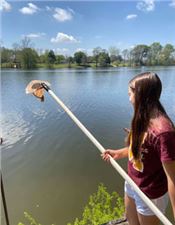Youth Wetlands Curriculum Available For At-Home Use
BATON ROUGE, LA.
Louisiana is home to some of the nation’s most productive wetlands. To get students educated on their importance, the LSU AgCenter Youth Wetlands Program has launched several education initiatives.
The program is creating content that involves activities that can be done at home while students across the state shelter in place.
“The lessons we have been sharing involve little or no materials,” said Brian Gautreau, Youth Wetlands Program director. “If materials are involved, we are also providing a list of common household items that can be substituted.”
The program has begun holding Wetland Wednesdays. It is a series of educational activities that can be conducted in any size wetland, including ponds, small ditches and bayous, or a conservation activity with a wetland component.
Wetland Wednesdays can be found on the Youth Wetland Program Instagram and Facebook pages, said Catherine Fox, an extension associate with wetlands responsibilities.
Materials for the program are also being featured on the Louisiana 4-H Facebook page because the AgCenter 4-H unit is responsible for conducting the program.
The educational material available through the Youth Wetlands Program are available online at youthwetlands.la4h.org.
“We plan on having Wetland Wednesdays through the end of May,” Fox said. “We are also involving the Louisiana 4-H Wetlands Ambassadors Team. They have produced some content, including videos featuring wetlands-based materials.”
One wetland ambassador, Joseph Hayes, of Avoyelles Parish, put together a video demonstrating how to manage a wood duck nesting box project.
“I got into wood duck conservation because the Avoyelles Wildlife Federation group was offering a free wood duck box if you wrote an essay about your project,” Hayes said. “It’s been so much fun for my family and me that we have maintained the wood duck project for the last five years.”
While some of the activities can involve parents, many can be done by the students themselves.
“The activities are adaptable,” Fox said. “They can be used as family activities or as an opportunity for students to explore wetlands on their own.”
Gautreau said the program was moving toward an online learning environment before the coronavirus pandemic, but the event has sped up the process.
“Our focus now is getting materials into the hands of youth as quickly as possible,” he said. “We will have a more robust delivery platform to support both students and teachers in the 2020-2021 school year.”
The Louisiana Coastal Protection and Restoration Authority is the funding agency for the program. ∆

Louisiana 4-H member Aubrey Powell tests her homemade dip net at Black River Lake in Monterey, La.
Photo by Ashley Powell/LSU AgCenter